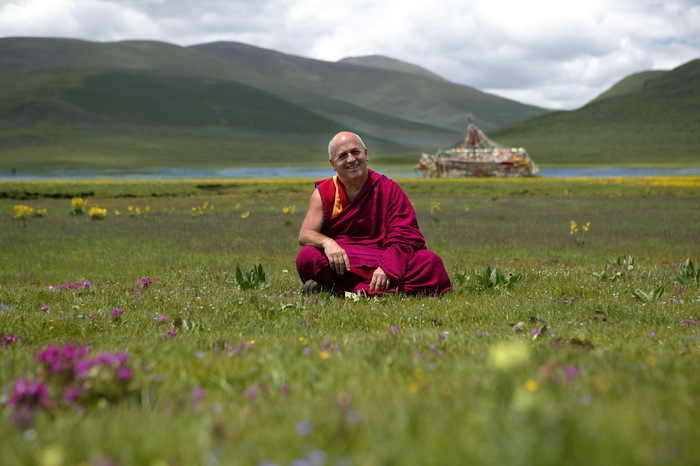
Matthieu Ricard is many things: a Buddhist monk, the author of several best-selling books, a translator for His Holiness the Dalai Lama, a skilled photographer, and a scientist.
Inspired by the great Tibetan Buddhist masters he met during his PhD in cell genetics, he completed his studies and then moved to the Himalayas, where he has been living for the past 45 years. He is one of the first long-time meditators to have participated in scientific research programs in laboratory settings, studying the effects of loving-kindness meditation on the brain. His unique lab results led to his viral moniker in popular media as “the world’s happiest man.”
All proceeds from Matthieu Ricard's books and photographs are donated to Karuna-Shechen, the humanitarian association he founded in 2000 to empower the underprivileged populations of the Himalayan regions of India, Nepal, and Tibet. In this interview, he speaks to Study Buddhism about why he left behind a promising scientific career for monkhood, the role of altruism in making our world a better place, and why we all need to speak out for animal rights.
Study Buddhism: You were studying cell genetics at the prestigious Pasteur Institute under the Nobel Laureate François Jacob when you embarked on the Buddhist path. Can you tell us what drew you to Buddhism?
Matthieu Ricard: When I was 20, I saw documentaries by Arnaud Desjardins on all the great Tibetan masters who had fled the Chinese invasion of Tibet and were living throughout the Himalayas. It felt as if there were 20 Socrateses, 20 Saint Francises of Assisi alive in our times and I felt a very strong inspiration to meet them. I travelled to Darjeeling in June 1967, and met Kyabje Kangyur Rinpoche, my root teacher. But I also met the Sixteenth Karmapa, as well as Dudjom Rinpoche, and many other great masters of the time.
I went back and forth between India and France every year for six years while I was doing my PhD at Pasteur Institute. As the years went on, I realized that while I was at Pasteur Institute my mind was always going to Darjeeling, and when I was in Darjeeling, I would completely forget Pasteur Institute! So, I felt, “That's not the right situation,” and after completing my PhD, I decided to stay in Darjeeling for good. I spent seven years there without coming back to Europe.
Was it easy to transition from such a promising scientific career to being a Buddhist disciple in India?
Science is about the rigorous pursuit of reality, of truth. There's science, the domain of outer phenomena – biology and physics. And there's the science of the mind, which Buddhism is about, which is the science of finding the cause of suffering and how to remedy the cause of suffering. I thought, “That's a good way to spend one's life,” especially with the incredible inspiration and presence of great enlightened masters.
What exactly is it that Buddhism can offer people in this day and age?
I feel that Buddhism addresses what we call the main question of life, which is, “Why should I continue to live?” You may know that you don't want to live a boring, meaningless life. But when you are 20, you may not know what the best way is to use your life. It became clear that I did not want to waste my life when I met my teachers. I had a sense of direction in the presence of these great masters. You see right in front of you what lies at the end of the path. The messenger has become the message: you have a living example right in front of you.
I think it's an immense fortune if we have the chance to meet the Dharma, to meet great teachers. We do have this precious human life, and it's wonderful, because that gives us the intelligence to find out what the causes of suffering are, and to try to remedy those causes. Yet, we are often quite lost.
It's a great fortune if we meet an authentic teacher, someone with compassion, knowledge, wisdom. A truly authentic teacher. And thanks to that teacher, to enter the path and then to progress step-by-step on the path and get rid of the cause of suffering. That's a great fortune and we should appreciate it if we have it and make good use of it.
It's up to you how much determination, how much confidence, how much of your whole being you'll put into it. It's up to you, but at least the path is clear.
It seems to have worked very well for you. After all, major media outlets have called you “the happiest man on earth”! How did this come about?
It's the biggest joke in the world! It started with a journalist who, one morning, didn't know what to write. It was in relation to studies at Richard Davidson's lab in Madison that I took part in, studying the effect of compassion on the brain.
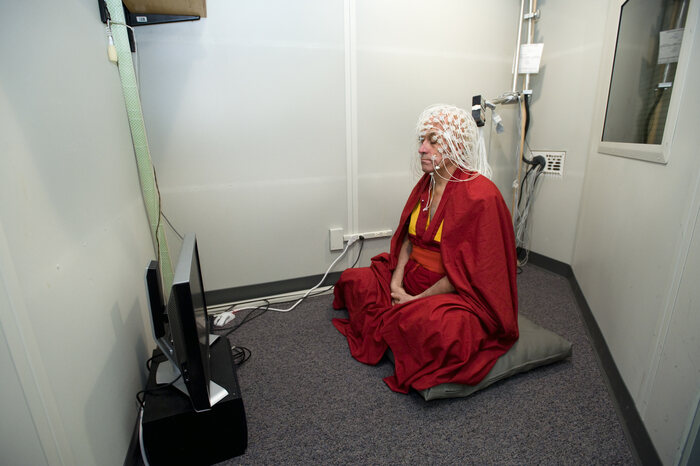
They found with myself and later with many greater meditators than me, that there was a very strong activation of gamma frequencies in the brain. Those gamma frequencies and the areas of the brain which are activated are also related to well-being. OK! In the end, there were 25 meditators.
How can you say out of 7 billion human beings that I’m the happiest: of course, this is nonsense! You can immediately understand that. But this being said, you know, I'm not terribly unhappy. I think this is thanks to my teacher, to trying my best even if I'm so lazy at putting their instructions to practice over half a century. You know, I could have done so much better, but at least the little bit I did contributed to at least enjoying life as it goes, and feeling very fortunate to have been on the path.
Your father, the late Jean-Francois Revel, was a prominent philosopher who, at the time, had difficulty with your decision to leave your promising scientific career to become a Buddhist monk. The book, The Monk and the Philosopher is a record of the dialogues between you and your father about your differing views, and your efforts to understand each other’s thoughts and views. Amongst other topics, you explore Buddhist philosophy and beliefs through the lens of your father’s Western philosophical thought and tradition. Is it useful for Buddhist practitioners to be well-acquainted with Western philosophy, or it just a confusing distraction?
It depends on what your path is, what kind of practice you are doing. If you are more of a contemplative, a meditator, following your teacher's instructions, especially if you are an Eastern practitioner, then I don't think you need Western philosophy. You don't even need an extensive philosophical background even within Buddhism.
On the other hand, if you are eagerly studying Eastern and Buddhist philosophy, culminating with Madhyamaka, and you also study logic, you are bound to be confronted with other viewpoints. Therefore, having some notion of what the main trends in Western philosophy are will help you to refine your own thinking, to dispel some shadows that you might have in your own understanding of Buddhist philosophy.
If you are confronted with some arguments, it will sharpen your mind. Buddhist philosophers debated with Hindu philosophers, and that helped them a lot to ascertain and establish their own views with clarity. I think there is indeed benefit in doing the same with other philosophies.
You are the author of the bestselling book Happiness: A Guide to Developing Life's Most Important Skill, which draws on scientific studies, Western literature and philosophy, and Buddhist thought. What is happiness, what is suffering? How do they differ?
Well, we know suffering a little bit better, right? From humans to little animals, nobody is looking for suffering, but we don't know how to recognize suffering. Sometimes what we call "happiness" is in fact suffering. There are some hidden causes of suffering such as ignorance, attraction, repulsion, hatred, jealousy, pride. These are mental toxins that cause suffering.
What is happiness? Ultimately, it's the complete freedom from mental obscurations: enlightenment! Of course, this is a tough call for most of us, it’s a long way. It's not all or nothing. Every step on the path in the right direction gradually erodes the causes of suffering. As you get rid of animosity, pride, jealousy and strong obsessive desires, you diminish the cause of suffering and every moment of life becomes more enjoyable.
When you achieve enlightenment, as His Holiness the Dalai Lama says, you have complete rest. Until then, we need constant effort.
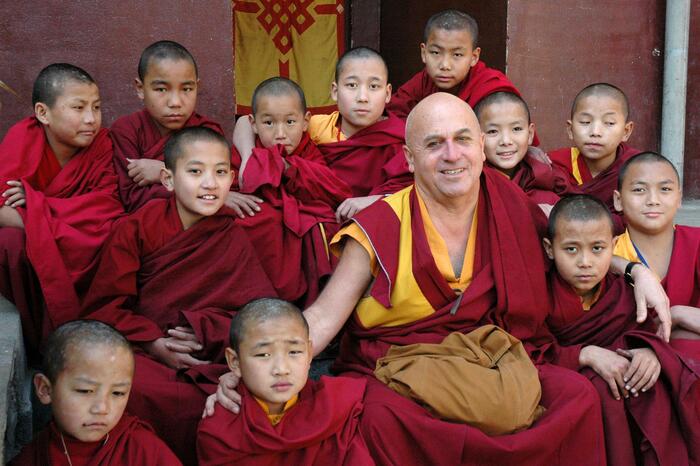
You witnessed the birth of the meditation and mindfulness movement in the West many decades ago. Now, “mindfulness” is everywhere and even corporations are offering courses on it to their employees. Is this a positive development?
35 years ago or so, when Jon Kabat-Zinn began MBSR, or mindfulness-based stress reduction, in hospitals, he did a tremendous service to humanity because it reached hundreds of hospitals, where people were suffering. It was beneficial not only to the patients but also to the caregivers, giving them a way to experience their own difficulties in a much healthier, more beneficial way.
Now, “mindfulness” is everywhere. When it goes to corporations, you might ask, "Why do they want to be more mindful?" Is it just to be more ruthlessly efficient? I strongly believe that the component of benevolence, of compassion, of altruism, naturally comes along if you do MBSR training properly. However, it's not expressed as explicitly as I think it should be, especially in the corporate world. If you are caring, you cannot be ruthless. There could be a mindful sniper, a mindful psychopath, but you can't have caring snipers and caring psychopaths.
We need to start with being mindful while growing and cultivating compassion. You get mindfulness and compassion both at the same time because to practice compassion and altruistic love, you need to be mindful.
While the main focus of Happiness was on individual happiness, your book Altruism makes the case that only an altruistic society can make the world a better place and solve the challenges facing our societies in the 21st century. What is altruism and how does it complement our striving for individual happiness?
Selfish happiness does not work. "Me, me, me…" all day long makes you miserable, and obviously you'll make everyone miserable around you. It feels wrong and also it's at odds with reality. We are not separate entities, who can build up happiness in a little bubble or little corner, and then others can do what they want. Reality is interdependent, and the supreme mental state, the most satisfactory emotion of all, is altruistic love, kindness, compassion, benevolence.
"Altruistic" means that you value others, you are concerned whether they are well, whether they suffer. If you find out that there is something that could be improved for their well-being and happiness, or to remove their suffering, you will have the intention to do something about that. Maybe you will not be able to do so, but it is your intention that is altruistic. Altruism is in the motivation. Of course, if you can, it will be followed up by action.
That’s the best way to benefit others. And, conversely, as a bonus, it's the best way to find happiness! It's like a secondary effect. Your own happiness will come along by accomplishing the happiness of others. But we need to be careful! If you don't care a damn about others, but you’ve just heard, "By doing good to others, I'll be happy. I don't care a damn, but here, I'm giving money to this beggar!" it's not going to work, because it's not just the action. The warm glow comes from being genuinely altruistic, not caring for yourself, but caring for others.
Look at His Holiness the Dalai Lama: "Compassion, compassion, compassion." That's what he says all the time. Whether you have five minutes to meditate or ten years to meditate, the practice needs to be altruistic love.
I’ve often heard His Holiness joke that if we really want to be selfish, we should all practice altruism because, as you said, we too receive wonderful benefits from it! Could you recommend a short meditation to develop altruism?
A short meditation on altruistic love is:
- Settle your mind by watching your breath for a few minutes.
- Then, fill your mind, fill your whole mental landscape with loving-kindness and compassion. Think, "May this person, which I have in mind – this little child, that parent, that person I met in the street – may that person be happy, may the positive aspirations of that person be fulfilled, may that person be spared suffering. If the person is suffering, may the root cause of that person's suffering be dispelled."
- You generate a feeling of benevolence and then maintain your mindfulness within compassion.
- If you are distracted you come back to it, if it dwindles you revive it.
I think that's a kind of meditation that can benefit others and yourself.
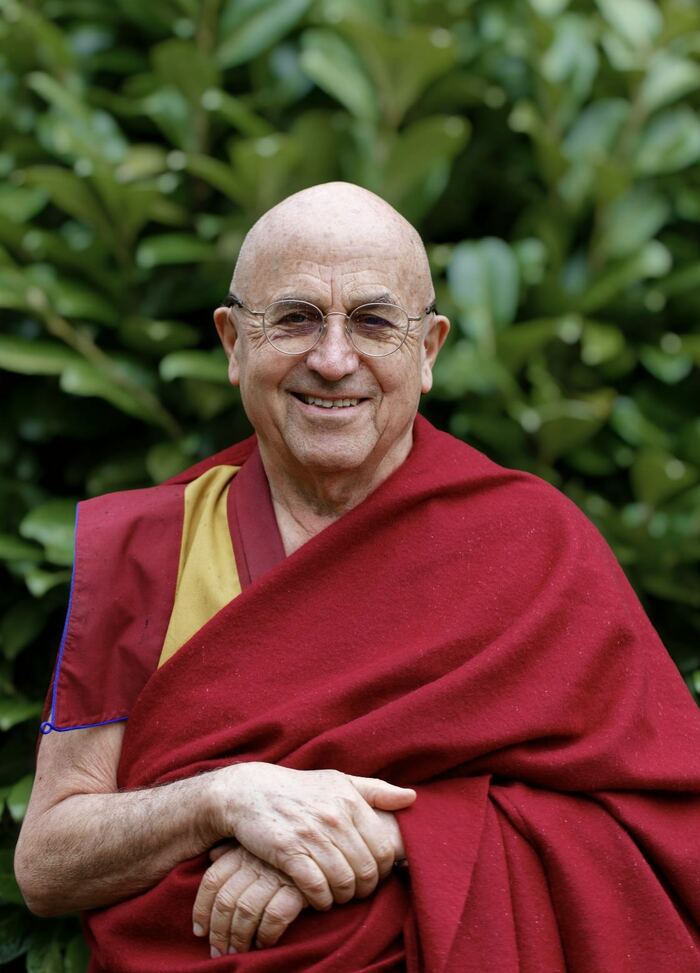
Thank you for this concise and inconceivably beneficial meditation. You explained how altruism is in the motivation and that it is much more valuable if we can follow up with real action. Is meditation without action still beneficial, or might we consider it excessive self-contemplation or an escape from the world?
We should not think of spiritual practice and meditation as something selfish. By no means! All the great masters of the past spent time in retreat. My teacher Khensur Rinpoche spent 30 years in retreat! Kyabje Trulshik Rinpoche almost the same. And my teacher, Kangyur Rinpoche spent so many years in retreat. If practising is about destroying clinging to the self and selfishness, how can this be selfish? It's like saying to someone who's been building a huge hospital over many years, "Oh, all this electricity work, plumbing, cement work doesn't help anyone, just go in the street and operate." This is stupid! When the hospital is ready, it's so much more beneficial. Likewise, when someone becomes like Khensur Rinpoche, or His Holiness the Dalai Lama, you can see how much more they can help sentient beings. In the case of His Holiness, this is the result of 60 years of practising for four hours a day, and spending time in retreat.
At the heart of benefiting others is our own progress to enlightenment. After all, in the Great Vehicle, the Mahayana, we say that the goal is not to become a Buddha and that’s it. The goal is to become a Buddha in order to be able to display the enlightened activities for beings, so that we can help them to remove their suffering. That is crucial.
A Buddha also has the ability to see the karma of sentient beings, to understand how many lifetimes they've roamed in samsara, roamed in ignorance, and give them the teaching that is perfectly appropriate for them to get out of the vicious circle of samsara. So, in a way, progressing on the path through meditation is the ultimate – and the only way in the end – to really help sentient beings.
Because otherwise, you are just patching up the symptoms, you are not getting at the root cause of suffering, which is ignorance, not knowing that all phenomena are empty of inherent existence. This leads to delusions to arise, solidifying and reifying the world, getting stuck in attraction and repulsion, and then endless suffering.
You’re a strong advocate for animal rights and encourage people to eat a meat-free diet, on which you wrote the book A Plea for the Animals: The Moral, Philosophical, and Evolutionary Imperative to Treat All Beings with Compassion. Why do we humans treat animals so horrifically?
There are many people suffering among human beings, but the way we treat animals nowadays is just appalling.
Six million animals are killed every hour for human use!
That's really a lot of animals and a lot of death. In one week, that’s more deaths than all the human losses in wars combined. There is clearly an ethical gap in our ethical system. We have made a lot of progress in our civilization – we have abolished slavery and torture – yet, when it comes to animals, we instrumentalize them.
Why do we instrumentalize them? Is it that we don’t see them as really sentient? That they can’t really think and feel? Is there a difference between human and animal minds?
Of course, there's a difference in the degree of intelligence. As for being sentient (beings who can differentiate between happiness and suffering), with the Cambridge Declaration on Consciousness, many great scientists of our time, including Christof Koch, a hard-nosed reductionist and disciple of Francis Crick, say that “higher animals” do have consciousness, and some animals such as birds even may have developed consciousness through different pathways than primates and humans.
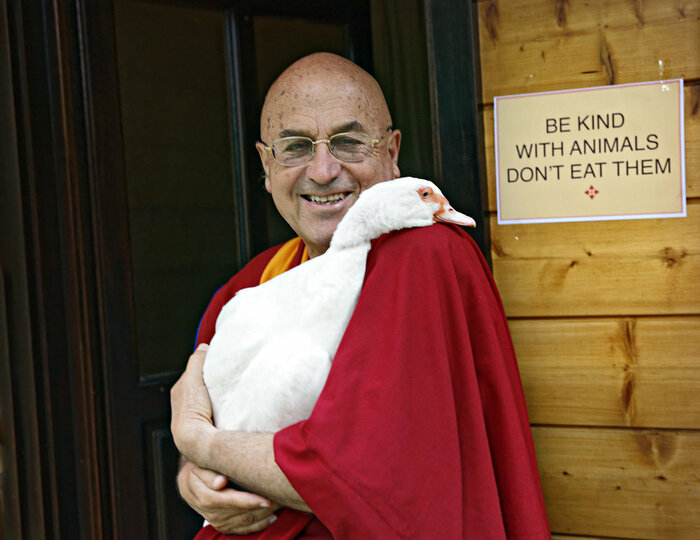
Pigeons and crows are extremely intelligent. New Caledonian crows can manufacture tools, they can use tools they are given in laboratories in new ways that they don't use in nature. They are extremely smart, yet, they don't have a prefrontal cortex. In terms of sheer intelligence, animals can do things that we cannot do: bats can fly in the dark thanks to their sonar, migratory birds can fly 10,000 kilometres looking at the stars or polarized light. We can’t do that. Everyone has the skills that are needed to survive, but in terms of being conscious, we believe that it is the same between animals and humans.
Do you have a final message for our readers?
I’ll repeat: it’s an immense fortune if we have the chance to meet the Dharma and to meet great teachers. It’s a great fortune if we meet an authentic teacher, someone with compassion, knowledge, wisdom. We should appreciate it if we have it and make good use of it.
But let’s not forget other sentient beings – it is not just liberation for oneself, which is very, very limited. We should include all other sentient beings, including animals as they also don't want to suffer!
Thank you so much for your time and for all you do to spread happiness and peace of mind in the world!